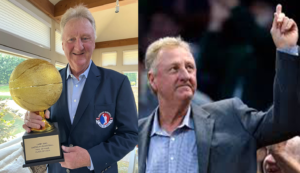
In the pantheon of basketball greats, few names resonate as deeply as Larry Bird. An emblem of excellence and a beacon of competitive spirit, Bird’s journey from a modest upbringing in West Baden Springs, Indiana, to enshrinement in the Basketball Hall of Fame is a story that transcends the confines of the sport. This chronicle of his career illustrates not only his extraordinary talents and achievements but also the indomitable will and tenacity that defined him as an athlete and individual.

Early Life and Influences
Larry Bird was born on December 7, 1956, in a small town influenced by the rural tapestry of Indiana. Raised in a family where basketball was not just a pastime but a passion, Bird’s early exposure to the game came from playing on outdoor courts and participating in local school competitions. His mother, a hardworking homemaker, and his father, a veteran of the Korean War, instilled in him the values of determination and resilience. These principles would serve as the bedrock for Bird’s illustrious career.
High School Stardom
Bird’s basketball prowess began to garner attention during his time at Springs Valley High School. His remarkable skills on the court led to numerous accolades, including an impressive senior year where he averaged 30.0 points per game. Despite his burgeoning talent, Bird’s journey was not without its challenges, as the young athlete battled self-doubt and the pressures of imminent success. After graduating, Bird received a basketball scholarship to Indiana State University, marking the beginning of his ascent into collegiate and eventually professional stardom.
Collegiate Breakthrough
At Indiana State, Larry Bird became a household name. Under the guidance of coach Bill Hodges, Bird transformed the Sycamores into a formidable force in college basketball. His junior year saw an unprecedented achievement as Indiana State reached the NCAA Championship game in 1979, a pivotal moment that would soon be immortalized in the annals of basketball history. The championship match against Michigan State, featuring a young Magic Johnson, captured the nation’s attention, establishing Bird and Johnson as the faces of the sport for years to come. Even though the Sycamores lost the game, Bird’s remarkable performance throughout the season and in the tournament solidified his status as one of the most promising prospects in basketball.
Arrival in the NBA
In 1978, Bird declared for the NBA Draft, and the Boston Celtics selected him with the sixth overall pick. This decision marked a turning point not only in Bird’s career but also in the trajectory of the league itself. The Celtics, a storied franchise with a rich history, had waned in prominence and desperately needed a revitalization. Bird’s arrival was timely, and within his first season, he made an immediate impact. His versatility, court vision, and sharpshooting ability set him apart, earning him the NBA Rookie of the Year award.
The Celtics’ Resurgence
Bird’s influence stretched beyond individual accolades; he was the catalyst for the Celtics’ renaissance in the NBA. Alongside fellow legends such as Robert Parish and Kevin McHale, the team surged to prominence, clinching three NBA championships in 1981, 1984, and 1986. Bird’s competitive nature and basketball IQ were instrumental in orchestrating the Celtics’ offence. His dedication to the game and fierce competitiveness manifested in epic battles against rivals, particularly the Los Angeles Lakers, culminating in a rivalry that would define an entire era of basketball.
Individual Accolades
Larry Bird’s transcendent skills were recognized through numerous awards and accolades throughout his career. He was a 12-time NBA All-Star, a three-time NBA Most Valuable Player (MVP), and was named to the All-NBA First Team multiple times. Bird’s prowess extended to the international stage as well, where he represented the United States in the 1992 Olympics as part of the “Dream Team,” further solidifying his status as one of the game’s all-time greats. His ability to perform under pressure and deliver in crucial moments contributed to his legendary status.
An Enduring Legacy
Bird’s retirement in 1992 was not an end but a transition into a different chapter within the realm of basketball. Post-retirement, he worked in various roles including coach and executive, demonstrating his passion for the game and his desire to influence the next generation of athletes. His tenure as the head coach of the Indiana Pacers saw him lead the team to the NBA Finals, showcasing his adept understanding of the sport from a strategic standpoint.
As a basketball executive, Bird’s insights into player development and team dynamics further reinforced his legacy within the sport. His commitment to excellence and knowledge of the game has influenced many players and executives alike, perpetuating the high standards he set during his playing days.
The Hall of Fame Induction
In 1998, Larry Bird was inducted into the Naismith Memorial Basketball Hall of Fame, recognizing his profound impact on the game of basketball. The honor signified not only his outstanding achievements on the court but also his character and the virtues he embodied throughout his career. Bird’s induction ceremony was a celebration of his legacy, attended by fellow athletes, coaches, and fans who revered him as a hero of the sport.
Larry Bird’s journey to Hall of Fame glory is a testament to the power of hard work, resilience, and unwavering dedication. His name is synonymous with excellence, and his story continues to inspire aspiring athletes and fans around the world. Bird’s legacy is palpable in today’s game, extending beyond mere statistics and accolades; it encompasses the ethos of basketball itself. As the sport evolves, the influence of Larry Bird will undoubtedly endure, solidifying his status as one of the greatest players in the history of basketball.
In the ever-expanding narrative of basketball history, “The G.O.A.T. Chronicles” recognizes Larry Bird not merely as a player but as an icon whose legacy will forever be etched in the minds and hearts of basketball enthusiasts.
Leave a Reply